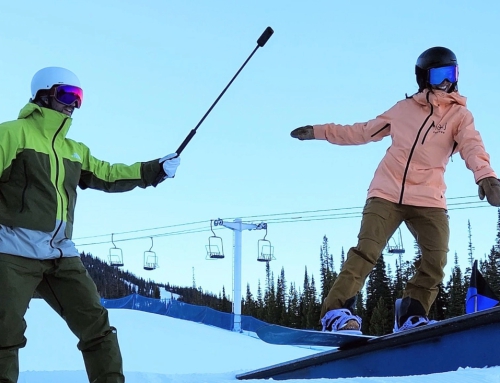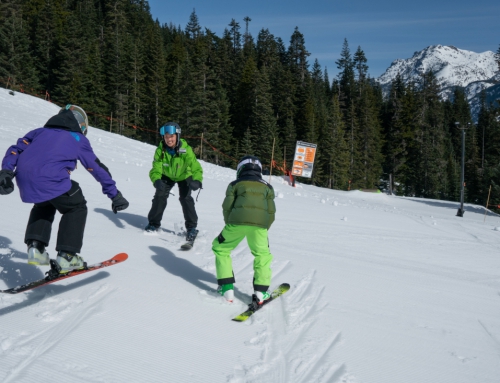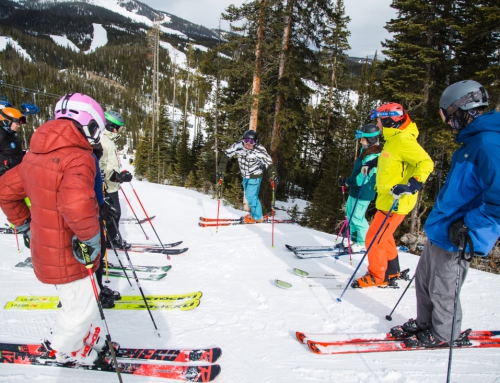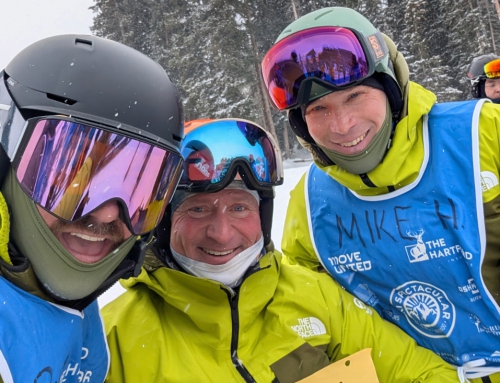32 Degrees: Meet Jess Kimura, The North Face Athlete
This interview by the PSIA-AASI Editorial Team originally appeared in the Spring 2023 issue of 32 Degrees. Access the entire magazine here.
Canadian Jess Kimura — whose grit, determination, and sheer talent has shaped a legendary career in urban snowboarding — is driven, dedicated, and decidedly bad-ass. With two Women’s Rider of the Year and five Women’s Reader’s Choice Awards from TransWorld SNOWboarding, a spot on ESPN’s list of the Top 50 Most Influential People in Action Sports, and a slew of Snowboarder magazine
Women’s Video Part of the Year honors to her credit, she’s now focused on giving back to the community that’s sustained her through personal triumph and tragedy.
Kimura created, produced, and funded “The Uninvited,” a three-part film project that gives other female riders a chance to shine for all the world to see. An athlete for The North Face, she also shares her heart-wrenching and inspirational story in the documentary “Learning to Drown.”
32 Degrees: You got your first taste of snowsports as a kid going to ski school every week at Silverstar, in British Columbia. How did that influence your arc in snowsports?
JK: The town I lived in was a 15-minute drive to the ski hill, so it was always a part of my life. We actually did ski school through a program in school. I remember there was this one snowboard instructor who was a girl, and she had such cool style. The only girl I had ever seen snowboard. Her name was Stacey Mori, and she had a racing board she let me try on the bunny hill. I didn’t start snowboarding until years later, but I always remembered that.
32D: Tell us a little about how you made the switch from skiing to snowboarding and ultimately found your niche in the urban scene.
JK: For me it was about access. I didn’t have a lot of money and riding in the streets was free. You didn’t need fancy equipment, just a shovel and a friend with a camera.
32D: Do you have an overriding philosophy about riding?
JK: That has changed over the years. It used to be about doing the craziest, biggest tricks. I would get hurt a lot. Now I realize I don’t need to suffer to prove myself. I’m trying to just enjoy myself these days and ride a lot of powder. I think it’s important to prioritize being able to ride again the next day over doing some super-crazy stunt. I’ve done all the stunts and it was fun, but I don’t want to hit my head anymore.
32D: What was the defining moment of those first few years of trying to break out in a traditionally male sport? And how did that shape your efforts to support other up-and-coming female riders?
JK: There were many defining moments; sometimes it felt like one long, never-ending roadblock. The industry and the people around me weren’t as supportive or welcoming as they are today. I think being shot down and left out so many times gave me a really good understanding of what it felt like to be on the outside. So, once I found success, I wanted to use it to bring other girls and women along with me. I was scared for what they might have to go through, so I tried to throw them a lifeline whenever I could.
32D: You definitely lay it all out there when you ride… and have the battle scars to show for it — both physically and mentally. What lessons in perseverance would you like to share with other riders?
JK: People say to me all the time “You’re fearless” or “You never give up,” but the fact is that I’m scared all the time and I give up all the time. I just pick myself back up and try again afterwards. So, it’s okay to be scared and it’s okay to want to quit, or even to actually quit. You can always take a break and try again. And as far as overcoming fear… I don’t really overcome it, I just let it exist beside me and do the thing anyway.
32D: You’ve been forthcoming about mental health issues you experienced at a young age and, especially, after your life partner, Mark Dickson, was struck and killed by a truck while dirt biking in 2014. You speak so eloquently of your personal journey in the film, “Learning to Drown.” What advice do you have for others struggling with their own mental well-being or other barriers in life?
JK: I think it’s important to acknowledge that adversity and hard times are unavoidable in life. No one is exempt. For a long time, I battled with the “unfairness” of losing Mark. But that just caused me to suffer more in the long run. Suffering is a part of life, but so is joy, laughter, and happiness. Just remember that nothing lasts forever. Not sadness, not joy, not relationships, not even life… so no matter how bad you might feel in any given moment, it won’t last forever, it will always change. Hang in there. And challenge yourself to reach out to friends or family if you are struggling.
32D: Going back to your ski-school beginnings for a moment, what advice would you give ski and snowboard instructors for how they can best instill a passion for snowsports in their students?
JK: I’d say to find a balance between the joy and fun of things and technique. Embrace personal style and encourage individuality.
32D: Anything else you’d like to share with our readers?
JK: Yeah, wear a helmet and a mouthguard and protect your brain!







